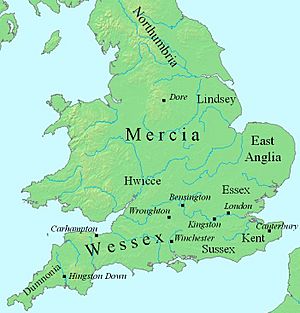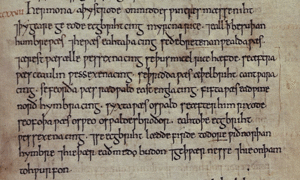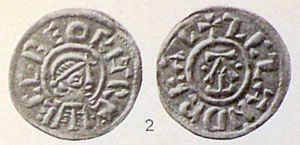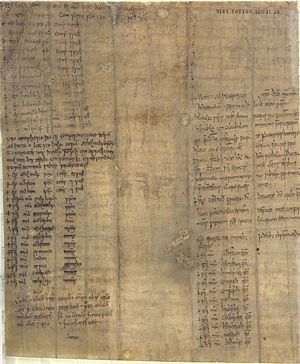Ecgberht, King of Wessex facts for kids
Quick facts for kids Ecgberht |
|
|---|---|
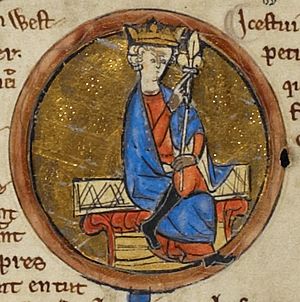
Depiction of Ecgberht from the Genealogical Chronicle of the English Kings, a late 13th-century manuscript in the British Library
|
|
| King of Wessex | |
| Reign | 802–839 |
| Predecessor | Beorhtric |
| Successor | Æthelwulf |
| King of Kent | |
| Reign | 825–839 |
| Predecessor | Baldred |
| Successor | Æthelwulf |
| Born | 771 or 775 |
| Died | 839 (aged 64 or 68) |
| Burial | Winchester |
| Issue | Æthelwulf, King of Wessex |
| House | Wessex |
| Father | Ealhmund, King of Kent |
Ecgberht (born between 770 and 775, died 839), also spelled Egbert, was the King of Wessex from 802 until his death. His father was King Ealhmund of Kent. In the 780s, Ecgberht was forced to leave England and live in exile at Charlemagne's court in the Frankish Empire. This happened because of the powerful kings Offa of Mercia and Beorhtric of Wessex.
When King Beorhtric died in 802, Ecgberht returned to England and became king. For the first 20 years of his rule, not much is known. However, it is believed he kept Wessex independent from Mercia. At that time, Mercia was the most powerful kingdom in southern England.
In 825, Ecgberht defeated Beornwulf of Mercia at the Battle of Ellandun. This battle ended Mercia's control over other southern English kingdoms. After this victory, Ecgberht took control of the areas Mercia had ruled in southeastern England. In 829, he defeated Wiglaf of Mercia and briefly ruled Mercia himself. Later that year, the king of Northumbria also accepted Ecgberht's authority. The Anglo-Saxon Chronicle, a historical record, then called Ecgberht a bretwalda. This means a 'wide-ruler' or 'Britain-ruler'.
Ecgberht could not keep this strong position for long. Within a year, Wiglaf regained the throne of Mercia. However, Wessex kept control of Kent, Sussex, and Surrey. These lands were given to Ecgberht's son, Æthelwulf, to rule as a subking under Ecgberht. When Ecgberht died in 839, Æthelwulf became king. The southeastern kingdoms eventually became fully part of Wessex after Æthelwulf's son, Æthelbald, died in 860. Ecgberht's family ruled Wessex and later all of England without interruption until 1013.
Contents
Ecgberht's Family Life
Historians have different ideas about Ecgberht's family background. The earliest version of the Anglo-Saxon Chronicle traces his son Æthelwulf's family line back to Ecgberht's father, Ealhmund. This Ealhmund is believed to be King Ealhmund of Kent. The family tree then goes back to Cerdic, who founded the House of Wessex. Some historians believe Ecgberht was from Kent, and his connection to the West Saxon royal family might have been created to make his rule seem more legitimate. Others think he was indeed from a West Saxon royal family.
We do not know the name of Ecgberht's wife. One old record from the 1400s says her name was Redburga. It claims she was a relative of Charlemagne and that Ecgberht married her while he was in exile in Francia. However, most modern historians do not believe this because the record is from so much later. Æthelwulf is their only known child.
Ecgberht is also thought to have had a half-sister named Alburga. She later became a saint for starting Wilton Abbey. Alburga was married to Wulfstan, a powerful nobleman from Wiltshire. After Wulfstan died in 802, she became a nun and the leader of Wilton Abbey.
Early Life and Exile

In the late 700s, Offa of Mercia, who ruled from 757 to 796, was the most powerful king in Anglo-Saxon England. The relationship between Offa and Cynewulf, who was king of Wessex from 757 to 786, is not fully clear. However, it seems Cynewulf managed to keep Wessex somewhat independent from Mercia. Offa did have a lot of influence in southeastern England, especially in Kent.
Another king named Ecgberht, Ecgberht II of Kent, ruled Kent during the 770s. In 784, a new king of Kent, Ealhmund, appeared in the Anglo-Saxon Chronicle. A note in the margin of the Chronicle says, "this king Ealhmund was Egbert's father [meaning Ecgberht of Wessex], Egbert was Æthelwulf's father." This supports the idea that Ecgberht's father was Ealhmund.
Ealhmund did not rule for long after 784. There is much evidence that Offa of Mercia took strong control of Kent in the late 780s. He seemed to want to fully take over the kingdom, not just be its overlord. It is possible that the young Ecgberht fled to Wessex around 785. The Chronicle later mentions that Beorhtric, who became king after Cynewulf, helped Offa to send Ecgberht into exile.
Cynewulf was killed in 786. Ecgberht tried to become king, but Beorhtric defeated him, possibly with Offa's help. The Anglo-Saxon Chronicle states that Ecgberht spent three years in Francia before he became king. He was exiled by Beorhtric and Offa. Some historians think the "iii" (three) might have been a mistake and it should have been "xiii" (thirteen) years. In any case, Ecgberht was likely exiled in 789, when Beorhtric married Offa's daughter.
During Ecgberht's exile, Francia was ruled by Charlemagne. Charlemagne was known to support enemies of Offa in southern England. Another English exile in Francia at this time was Eadberht III Præn, who later became king of Kent. A later writer, William of Malmesbury, said that Ecgberht learned how to govern during his time in Francia.
Ecgberht's Early Reign
Beorhtric's dependence on Mercia continued under Cenwulf, who became king of Mercia after Offa's death. Beorhtric died in 802, and Ecgberht became king of Wessex. He likely had the support of Charlemagne and perhaps even the Pope. The Mercians still opposed Ecgberht. On the day he became king, the Hwicce, a group from Mercia, attacked. They were led by their nobleman, Æthelmund. Weohstan, a Wessex nobleman, met them in battle. According to a later source, Weohstan was Ecgberht's brother-in-law. The Hwicce were defeated, but both Weohstan and Æthelmund were killed.
For more than twenty years after this battle, nothing more is recorded about Ecgberht's dealings with Mercia. It seems Ecgberht had no power outside Wessex, but he also never submitted to Cenwulf's rule. Cenwulf did control the rest of southern England. However, he never used the title "overlord of the southern English" in his official documents. This was probably because Wessex remained independent.
In 815, the Anglo-Saxon Chronicle reports that Ecgberht attacked and destroyed the lands of the last British kingdom, Dumnonia. This area is now Cornwall. Ten years later, in 825, Ecgberht was fighting in Dumnonia again. This might be connected to a battle in 823 between the people of Devon and the Britons of Cornwall.
The Battle of Ellandun
Also in 825, a very important battle in Anglo-Saxon history took place. Ecgberht defeated Beornwulf of Mercia at Ellandun, near Swindon. This battle marked the end of Mercia's control over southern England. The Chronicle describes how Ecgberht followed up his victory: "Then he sent his son Æthelwulf from the army, and Ealhstan, his bishop, and Wulfheard, his ealdorman, to Kent with a great troop."
Æthelwulf drove Baldred, the king of Kent, north across the Thames. The Chronicle says that the people of Kent, Essex, Surrey, and Sussex then all submitted to Æthelwulf. It says they did this "because earlier they were wrongly forced away from his relatives." This might refer to Offa's actions in Kent when Ecgberht's father, Ealhmund, became king.
The Chronicle makes it seem like Baldred was driven out right after the battle. However, this was probably not the case. A document from Kent dated March 826 shows that Beornwulf still had authority there. This means Baldred was likely still in power under Mercian rule. In Essex, Ecgberht expelled King Sigered. The exact date is not known, but it might have been in 829.
Historians believe Beornwulf probably attacked Ecgberht first at Ellandun. Beornwulf might have seen an opportunity when Wessex was fighting in Dumnonia in the summer of 825. He may have attacked because he feared unrest in the southeast. Wessex's family ties to Kent made it a threat to Mercian power.
The results of Ellandun were huge. Mercia lost its power in the southeast. The Chronicle also says that the East Anglians asked Ecgberht for protection from the Mercians in 825. In 826, Beornwulf invaded East Anglia to regain control, but he was killed. His successor, Ludeca, also invaded East Anglia in 827 for the same reason and was also killed. This was a disaster for Mercia and confirmed Wessex's power in the southeast.
Ecgberht Defeats Mercia
In 829, Ecgberht invaded Mercia and forced Wiglaf, the Mercian king, into exile. This victory gave Ecgberht control of the London Mint. He even issued coins as King of Mercia. After this victory, a West Saxon writer called him a bretwalda. This means 'wide-ruler' or 'Britain-ruler', in a famous part of the Anglo-Saxon Chronicle.
The Chronicle names seven previous bretwaldas. These are the same seven kings that Bede, an earlier historian, listed as holding imperium (a kind of supreme authority). The list starts with Ælle of Sussex and ends with Oswiu of Northumbria. The exact meaning of bretwalda has been debated. It has been called a "term of praise in poetry," but it also seems to mean a military leader.
Later in 829, the Anglo-Saxon Chronicle says that Ecgberht received the submission of the Northumbrians at Dore (now a part of Sheffield). The Northumbrian king was probably Eanred. A later writer, Roger of Wendover, said that Ecgberht invaded Northumbria and plundered it before Eanred submitted. He wrote: "When Ecgberht had obtained all the southern kingdoms, he led a large army into Northumbria, and laid waste that province with severe pillaging, and made King Eanred pay tribute." The Chronicle itself does not mention these details. Some historians suggest the meeting at Dore was more about both kings recognizing each other's power.
In 830, Ecgberht led a successful attack against the Welsh. He likely wanted to expand Wessex's influence into the Welsh lands that Mercia used to control. This marked the peak of Ecgberht's power.
Changes in Power After 829
In 830, Mercia regained its independence under Wiglaf. The Chronicle simply says that Wiglaf "obtained the kingdom of Mercia again." This probably happened because of a Mercian rebellion against Wessex.
Ecgberht's control over southern England ended when Wiglaf regained power. Documents show Wiglaf had authority in Middlesex and Berkshire. In a document from 836, Wiglaf referred to "my bishops, duces, and magistrates." This group included eleven bishops from the Canterbury church area, even bishops from Wessex territory. This shows Wiglaf could still gather important people. Wessex did not hold such large meetings. Wiglaf might have also brought Essex back under Mercian control. In East Anglia, King Æthelstan started minting his own coins. This likely happened around 830, after Ecgberht's power lessened. This shows East Anglia's independence, especially since Æthelstan was probably responsible for the deaths of both Beornwulf and Ludeca.
Historians have looked at why Wessex rose so quickly in the late 820s and then lost some of its power. One idea is that Wessex's success depended partly on support from the Carolingians (the Franks). The Franks had supported other kings in England. Ecgberht was in contact with Louis the Pious, the Frankish king, in 839. This suggests a continuing relationship between the Franks and southern English politics.
Frankish support might have helped Ecgberht's military successes in the late 820s. However, trade networks in the Frankish Empire collapsed around the 820s or 830s. Also, a rebellion against Louis the Pious started in 830. These problems might have stopped Louis from supporting Ecgberht. If Frankish influence decreased, the kingdoms of East Anglia, Mercia, and Wessex would have had to find a new balance of power on their own.
Despite losing some dominance, Ecgberht's military victories changed England forever. Wessex kept control of the southeastern kingdoms, except possibly Essex. Mercia did not regain control of East Anglia. Ecgberht's victories meant the end of Kent and Sussex as independent kingdoms. These conquered areas were ruled as a subkingdom for a while, including Surrey and possibly Essex. Although Æthelwulf was a subking, he had his own royal court and traveled his kingdom. Documents from Kent called Ecgberht and Æthelwulf "kings of the West Saxons and also of the people of Kent." It was not until after Æthelwulf died in 858 that these kingdoms were fully joined with Wessex.
Mercia remained a threat. Ecgberht's son Æthelwulf, as king of Kent, gave land to Christ Church, Canterbury. He probably did this to reduce any Mercian influence there.
In the southwest, Ecgberht was defeated in 836 by the Danes at Carhampton. But in 838, he won a battle against the Danes and their allies, the West Welsh, at the Battle of Hingston Down in Cornwall. The royal family of Dumnonia continued after this, but this battle marked the end of one of the last independent British kingdoms. We do not have many records about how the Anglo-Saxons expanded into Cornwall. However, place names give some clues. The River Ottery seems to have been a boundary. South of the Ottery, place names are mostly Cornish, while to the north, they are more English.
Ecgberht's Successor
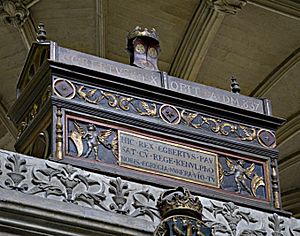
At a meeting in Kingston upon Thames in 838, Ecgberht and Æthelwulf gave land to the churches of Winchester and Canterbury. In return, the churches promised to support Æthelwulf's claim to the throne. The archbishop of Canterbury, Ceolnoth, also accepted Ecgberht and Æthelwulf as protectors of the monasteries he controlled. These agreements show that the church recognized Wessex as a new, powerful kingdom. Church leaders helped crown kings and wrote wills that named the king's heir. Their support was very important for establishing Wessex's control and making sure Ecgberht's family could take the throne smoothly.
We do not know about other people who might have claimed the throne. However, there were likely other descendants of Cerdic who could have fought for the kingdom. Ecgberht died in 839. His will, as described by his grandson Alfred the Great, left land only to male members of his family. This was to make sure the family's wealth stayed within the royal house. Ecgberht gained much wealth through his conquests. This wealth helped him get the support of the church in the southeast. His careful will shows he understood how important personal wealth was for a king. The kingship of Wessex had often been fought over by different branches of the royal family. It was a great achievement for Ecgberht that he was able to ensure Æthelwulf became king without trouble. Also, Æthelwulf's experience ruling the subkingdom in the southeast was very valuable when he took the main throne.
Ecgberht was buried in Winchester, as were his son Æthelwulf, his grandson Alfred the Great, and his great-grandson Edward the Elder. During the 800s, Winchester began to grow into a town. The fact that these kings were buried there shows that the West Saxon royal family held Winchester in high regard.
See also
 In Spanish: Egberto de Wessex para niños
In Spanish: Egberto de Wessex para niños
 | Bessie Coleman |
 | Spann Watson |
 | Jill E. Brown |
 | Sherman W. White |


